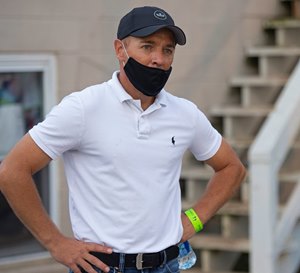Kentucky Horsemen Emphasize Importance of HHR Gaming


Five individuals employed in the racing industry met with reporters Feb. 2 at Skylight Training Center in Goshen, Ky., to express their backing of legislation that will allow for continued historical horse racing gaming in the state.
Tommy Drury, trainer of 2020 Toyota Blue Grass Stakes (G2) winner Art Collector, and jockey Declan Cannon were among those that spoke at the Kentucky Horsemen's Benevolent and Protective Association-organized event. They were joined by Steve Wade, owner of the horse tack shop Skylight Supply, farrier Gary Churchman, and Kentucky HBPA executive director Marty Maline.
All five stressed the financial impact that HHR gaming has on the horse industry by bolstering purses from a percentage of HHR handle—funding that could be in jeopardy unless the Kentucky legislature passes an HHR-protecting bill this month. HHR devices, in operation in the state for approximately a decade, resemble slot machines but their results are generated from previously run horse races.
Under current state law, their legality is in question. In September, the Kentucky Supreme Court unanimously ruled that at least one brand of HHR did not fit the state's definition of pari-mutuel wagering. Since that time, most HHR gaming facilities have remained open, though one location at The Red Mile, which the harness track operates with Keeneland, suspended operations Jan. 24 in a move intended to spur legislative action.
"This is something that is not only important to us as horsemen but it's important to the state, the trickle-down effect that this has and that the equine community has," said Drury. "It's going to affect all of us, whether it's a farmer that sells hay or a person that owns a horse transport company, or the feed companies. There are a lot of people that rely on horse racing to feed their families."
Drury, based at Skylight, runs most of his stable during the winter months at Turfway Park in Northern Kentucky, where Cannon is riding after spending some past winters out of state at tracks such as Oaklawn Park in Arkansas and Fair Grounds Race Course & Slots in Louisiana. Those tracks are buoyed by either casino gaming or slot machines.
He wants to ride in Kentucky year-round, but without HHR, "I'd probably have to move," he said.
Nor would he be alone, Maline said. He believes racing at Turfway Park, Kentucky Downs, and Ellis Park would all be in jeopardy without HHR gaming. All three were purchased by new owners over the past couple of years, largely due to the profitability of HHR gaming for racetrack operators.
Churchill Downs Incorporated paid $46 million to acquire Turfway in the fall of 2019 and pledged $100 million toward a new facility and backstretch improvements. After tearing down the aging grandstand in preparation for work on a new frontside building, last year CDI suspended developments while awaiting HHR action.
The ongoing race meet is taking place with temporary facilities and existing structures utilized by staff, plans that had been in place for the winter even if the track's rebuild had continued.
"I think it's a pretty good indication when Churchill stopped all construction, that if this thing doesn't materialize and (unless) we get this thing resolved, Turfway will cease to be," Maline said.
Without the passage of a bill this legislative session—which is expected to face some anti-gambling opposition in Kentucky's conservative legislature—the picture is also bleak at Ellis Park in Henderson, where the track faces competition from Indiana casinos.
"I talked with Ellis Park's management just last week," Maline said. "In no uncertain terms, they're gone."
Churchill Downs and Keeneland, Kentucky's two leading racetracks, would be expected to continue operations under a gaming-shutdown, though with diminished purses.
HHR clarifying-legislation is backed by Gov. Andy Beshear, a Democrat, and Republican legislators such as Senate Majority Floor Leader Damon Thayer (Georgetown), Rep. Adam Koenig (Erlanger), and State Sen. John Schickel (Union).
HHR faces opposition from The Family Foundation, a group that opposed HHR in court that advocates for conservatism and faith-based stances in the legislature. The Family Foundation believes the racing industry and the Kentucky Horse Racing Commission did not have the legal right to offer HHR gaming under Kentucky horse racing law.
The horse industry is responsible for 60,000 direct and indirect jobs in Kentucky and $5.2 billion in economic impact statewide, according to figures from the Kentucky Chamber of Commerce. HHR generated more than $15 million in the fiscal year 2020 for Kentucky Thoroughbred Development Fund purses.
The Kentucky Equine Education Project, which lobbies for the racing industry, has urged residents to contact lawmakers expressing their support of HHR.
